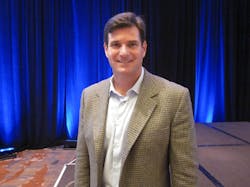ASC 2013: Nearly Electrocuted on the Job, Olympian Meidl Energizes Crowds with Safety Message
Cliff Meidl took the hard road to becoming a safety ambassador.
In November 1986, when Meidl was a 19-year-old apprentice plumber, he hit an underground power line while excavating at a Los Angeles construction site. The 30,000-volt surge of electricity stopped his heart three times, blew two toes off his right foot and eviscerated a third of the bone in both knees.
It took multiple skin grafts to repair the various exit wounds on his body, and a radical surgery to save his legs. More than 25 years later, Meidl still has difficulty walking.
Meidl has leveraged the experience to become a powerful spokesman for workplace safety.
"Safety is one of those things that I wish I would've known more about," Meidl said during a keynote presentation at the 2013 America's Safest Companies Conference in Atlanta.
Red Flags
On the day of the accident, Meidl was "green" and eager to prove his worth. So when a foreman asked Meidl to help with some excavation work, he didn't hesitate to pitch in.
It was supposed to be a "side job" – 10 minutes, tops.
"I remember my job foreman said, 'Cliff, grab this jackhammer. You're going to be working with the backhoe operator,' who at that time was a mentor and a really good friend of mine. 'You guys are going to do a quick little excavation of this area and that's it; you're just going to break away this concrete and then we're done with the job.'"
The job wasn't so tidy, though.
In retrospect, the red flags were practically visible from outer space.
"We should have done a locate to find out if there were any underground utilities on the job site," Meidl said.
"We should have had a qualified person and we should have had a competent person on the job site, being able to say, 'Hey listen, what are some of the potential hazards out here? How are we going to to circumvent those hazards? Are we going to be able to work around those by turning off the power?'
"But a lot of that stuff wasn't done because, in fact, we thought we would be able to get the job done quickly, and it would be over with and we wouldn't have this type of incident. And ultimately it led nearly to the loss of my life."
Powerful Message
The physical and emotional anguish brought on by the accident makes for a gripping cautionary tale about the need for constant safety vigilance. But it's also a story about how the human spirit, indomitable as it is, can triumph over adversity.
With his legs in tact but weakened and spindly, Meidl – at the urging of his brother – took up outrigger canoe paddling. He built up his upper-body strength, and went on to become a two-time Olympic kayaker.
During the opening ceremonies of 2000 Summer Olympic Games in Sydney, Australia, Meidl represented the United States by carrying the American flag into the stadium.
"I was nervous," Meidl recalled. "I walked like Bambi. I was still missing a third of the knee compartment in both my legs. I remember holding the flag out there, taking a deep breath, turning around and looking behind me, and I was so proud to be an American."
In recent years, Meidl has served as a spokesman for "811," a campaign encouraging companies and individuals to call the national 8-1-1 hotline to check for utility lines before digging into the ground.
As more power and telecommunications pipelines, conduits and cables are moved underground, calling 8-1-1 can avoid damage to our underground infrastructure – and potentially life-threatening injuries.
"Statistics show that if you don't dial 8-1-1 before you dig, you end up damaging underground utilities 30 percent of the time," Meidl explained. "If you call 8-1-1, we can get it down to less than 1 percent."
Of course, failing to look for underground utilities was just one of many safety lapses that occurred on Nov. 19, 1986.
"I should've been wearing steel-toe boots, and I should've been wearing protective covers because I was operating a jackhammer," Meidl said, adding that there was no safety tailgate meeting that morning. "But as you know, this was one of those simple jobs that was only going to take a couple of minutes."
For Meidl and his family, the repercussions of the quick and simple job have lasted a lifetime.
